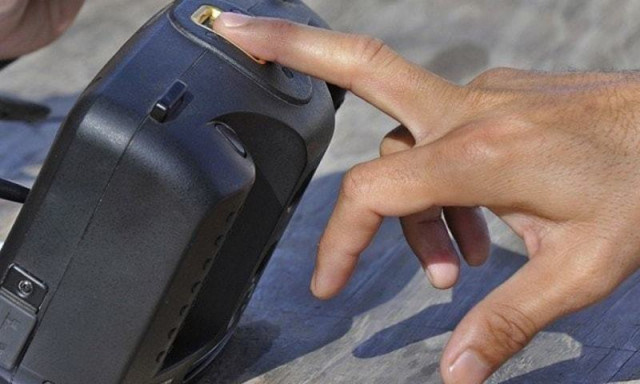Performance of biometric machines poor: ECP
Failed to read fingerprints of 12% voters in NA-120 by-polls

Plan to use biometric machine receives setback. PHOTO: FILE
He was briefing about a report at ECP headquarters here.
The discouraging results implied that ECP will not be moving away from conventional system to digital mode in the foreseeable future – at least not in the upcoming general elections scheduled to be held next year.
ECP used 100 BVMs in 39 polling stations of NA-120.
The Secretary ECP said the area covered by 39 polling stations was home to as many as 57,265 registered voters – 30,9979 men and 20,959 women.
All NA-120 voters eligible to cast ballots: ECP
According to the report, at least 22,181 voters used BVMs, adding that these machines were able to verify fingerprints of 19,520. However, these machines were unable to read fingerprints of 2,646 voters – or 12 per cent of the people who used this technology.
“These results are not encouraging. If this ratio is taken as average, the machines will not be able to verify 11.6 million voters out of 90.7 million registered voters across the country,” remarked Babar Yaqoob.
He said that if the technology had been tested in a rural constituency, the ratio of unverified voters would have been much higher.
Sources in the ECP said that the commission had run a low-key test in a constituency in Khyber-Pakhtunkwa a few months ago. The results were even more abysmal – machines failed to read fingerprints of nearly 40 per cent of voters.
Despite media hype and pressure from certain political parties, ECP remained reluctant to use electronic voting, citing technical glitches.
ECP unlikely to use modern techniques in NA-120 by-polls
ECP suffered a major set-back last month when the National Database and Registration Authority (NADRA) informed it last month that it did not have fingerprint record of more than 29,000 voters in NA-120 which had as many as 321,786 registered voters.
After this development, the ECP decided to shelve its plan to use EVMs.
In July this year, the ECP had to abandon plan to test biometric verification machines in Sindh Assembly’s PS-114 constituency after NADRA refused to share the required data.
On Friday, NADRA clarified that when the ECP had decided to install biometric voting machines, the registration authority had been asked to provide biometric fingerprints of voters in NA-120. Subsequently, of the total 321,786 voters in this constituency, NADRA could not provide data of 29, 607 voters.
NADRA said it had introduced biometric fingerprint machines in 2005-06 before this period, fingerprints were used to be taken on paper-based forms.
At least 772 people were unable to register fingerprints because of bad print quality, amputated/bandaged hands/fingers of elderly persons, NADRA stated on record.



















COMMENTS
Comments are moderated and generally will be posted if they are on-topic and not abusive.
For more information, please see our Comments FAQ